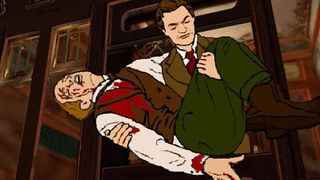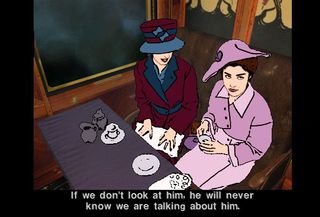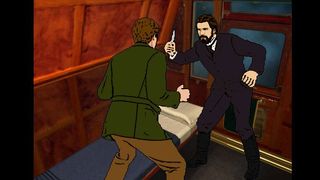Crapshoot: The unforgettable mystery of The Last Express
We're rerunning Richard Cobbett's classic Crapshoot column, in which he rolled the dice and took a chance on obscure games—both good and bad.

From 2010 to 2014 Richard Cobbett wrote Crapshoot, a column about bringing random obscure games back into the light. This time he boards the Orient Express as it heads for straight for murder, action, suspense, and hopefully as far away from that snotty little Belgian detective as possible.
Please, get your wallet. Get your purse. Prepare to search behind the back of your sofa. This week, I'm not simply going to talk about an obscure game—I'm going to do everything I can to sell it to you. As of this week, The Last Express is available on GOG and Steam. If you've never played it before, you should buy it. It's the price of a pint of cheap booze, bartender spit, and little bits of unidentifiable grit. If you spend it here, you'll get to play one of the most unique adventure games ever made, and see that in the right hands, absolutely anything—even walking up and down a train corridor for several hours—can be a captivating, unforgettable experience.
The Last Express is the game that Jordan Mechner made between Prince of Persia and... well... Prince of Persia. It's a game that's not so much played as experienced; a mix of adventure game and atmosphere piece set on the final journey of the Orient Express before World War 1. You play an American called Robert Cath, summoned to the train by a man called Tyler Whitney, and if that sounds vague, it's intentional. At the start of the game, you don't even know that. You don't know who you are, not because of some silly amnesia, but because Cath feels no need to explain himself. If you check his coat, you'll find a newspaper clipping that suggests he's on the run, but nothing about whether he's innocent or guilty, a good man or a villain, or anything else that you'd normally know off the bat. This only gets more complicated when Tyler shows up dead, and Cath immediately decides to steal his identity.
In short, you're a man you know nothing about, pretending to be another man you know nothing about, stuck in the middle of a complex mystery you have no idea about, on a train which holds, among others, the last of the Russian royal family and a budding anarchist, a German industrialist who thinks you're buying 'merchandise' from him, a group of sinister Serbians, and the man in the final carriage, who ignores your facade in favour of "What an unexpected pleasure. Mr. Robert Cath." There's also missing treasure, at least one dead body on board, a mysterious poem, and in just a couple of days, the Great War is going to explode in everyone's face. Not that they know it, or can do anything to stop it.
Welcome aboard The Last Express. Enjoy your journey!

This is definitely one of those games where the less you know, the more you'll get out of it. If you already know you're going to buy it, stop now. Come back if you don't find it clicking for you though, as that's quite common. A bit like Planescape, a very slow start masks how good it is, and it's easy to feel either lost, or stressed out by the constantly ticking clock. The best advice here is not to worry about it. You can rewind as much as you want, most of what happens in the game is there for atmosphere more than anything else, and if something is important, it's good at letting you know. There aren't actually that many real puzzles in the game, although there are several... call them... 'situations' to deal with, all but one of which are well telegraphed and give you plenty of chance to get where you need to be.
(There are also some truly dire fight sequences, but if you just spam right-clicks, after a few attempts the game will just continue as if you'd won. Try to play them, but don't feel bad about cheating.)
The biggest gaming news, reviews and hardware deals
Keep up to date with the most important stories and the best deals, as picked by the PC Gamer team.
What really sells The Last Express is its amazing atmosphere and attention to detail. The train itself is an excellent recreation, with a life of its own. Characters are always moving back and forth, chatting, sitting around in their cars or just generally marking what is, for them, a fairly uneventful journey. One of the best little touches is that the game takes place over several days, and one of the conductors likes to while away his time by drawing pictures of the current passengers. Sneak a peek at his sketchbook at the start of the game, and it's empty. Take another look near the end and it's full of little drawings. Steal something, and you'll overhear people talking about it. Need to hide from someone who wants to hurt you? If you simply lock yourself in your room, they can't get in. Sit there long enough, and eventually they'll have to leave.
The whole game is packed with this kind of small but beautiful detail, some of it plot-related, some of it just thrown in for the hell of it. For example, at one point, two of the characters decide to put on a private concert, which you're invited to. You're supposed to make your excuses and take the opportunity to go raid some of other guests' rooms while they're distracted, but if you just want to sit where you are and enjoy the music, that's fine too. You can always turn the clock back later on and go snooping in your own time.

By far the best though is how it handles different languages. Cath speaks a few, including French and Russian, and when he overhears them, you get subtitles (in one of the earliest cases, two young women talking about him in French, oblivious to the fact that he understands every single word). Overhear anyone speaking a language he doesn't know, and you only get the sound, regardless of how important the contents may be to the plot. All of the acting however, no matter which country it comes from, is handled by one of its native speakers, adding immeasurably to the atmosphere and authenticity. If there's one thing that truly marks The Last Express out as a labour of love, it's this. They could have cheaped out. They could have assumed nobody would care and just told some local American actors to put on accents.
They didn't. They chose to do it properly . And it's fantastic.
The problem with The Last Express is that when you first fire it up, it's very, very slow. You have to sink into it, and a number of the design choices that feel very natural by the end don't really help with this. The flick-book animation style is easily the most divisive. It was done by hiring actors, filming them, and then hand-painting individual frames to get a very unique, art-deco look. As with a lot of unusual games, it's a style that starts off incredibly jarring, but you don't even notice after a while.
Many other elements are animated however, including characters walking up and down the corridors, the fight sequences, and—most subtly—the fantastic way that the characters meet your eyes as they step past you and comment as they step past, making you feel like you're actually a physical character in the world, and not some ghost they can just walk straight through. It's amazing how much a simple 'excuse me' can show their personality, or how the tiny detail of the conductors standing up whenever you go past helps to boost the environment's believability ten-fold. It may seem like an empty game at points, and it is, but the sheer amount of stuff that takes place in it, important and otherwise, is really, really impressive. You really get to know your fellow passengers, regardless of how much or little they have to do with you.

All I'm going to say about the actual story is that I like it a lot. The Last Express is very specifically built to be a microcosm of the great powers on the eve of the war, and you don't need to get too literary minded to observe the metaphor of it barrelling in a straight line towards conflict. Beyond that, it's best to take it at its own pace and on its own terms—drinking in the fine atmosphere, and using your observational skills to help keep Cath both alive and on the train as it travels from Paris to Constantinople. There are periods where not much happens and it gets a bit dull. There are bits where it absolutely races along, especially as you approach the final destination. There are bits you'll feel smart about. There are bits you'll be glad you can simply rewind time and try again. And there's one of the finest pieces of credits music in the history of games. I'm whistling it right now. In fact, I'll embed it here, so that you can too.
In the end, what matters is that whether you like it, love it, or hate it, The Last Express is both unique, and everything it promises. It brought so many phenomenal ideas to the table, most of which have been stuck growing mouldy ever since, from the extra-dynamics of a real-time world, to the design advantages of such a tight, limited location where even the smallest of plot elements can bounce and ricochet off the walls and have real consequences. It presents problems rather than puzzles, it treats the smallest of details with as much care as the big explosive ones, and while it absolutely died on the shelves, it still lives on in the hearts of almost everyone with a soul who played it. Even if you absolutely hate it, and the mere thought of it makes you want to grab a knife and stage an audience-participation version of Murder On the Orient Express, you can console yourself with the thought that you've played a game like no other.
You've read this far. Doesn't all this sound worth your time?
Yes. Yes it does. Go here and buy it at once, before it yet again disappears into the cold, dark night.
Most Popular

